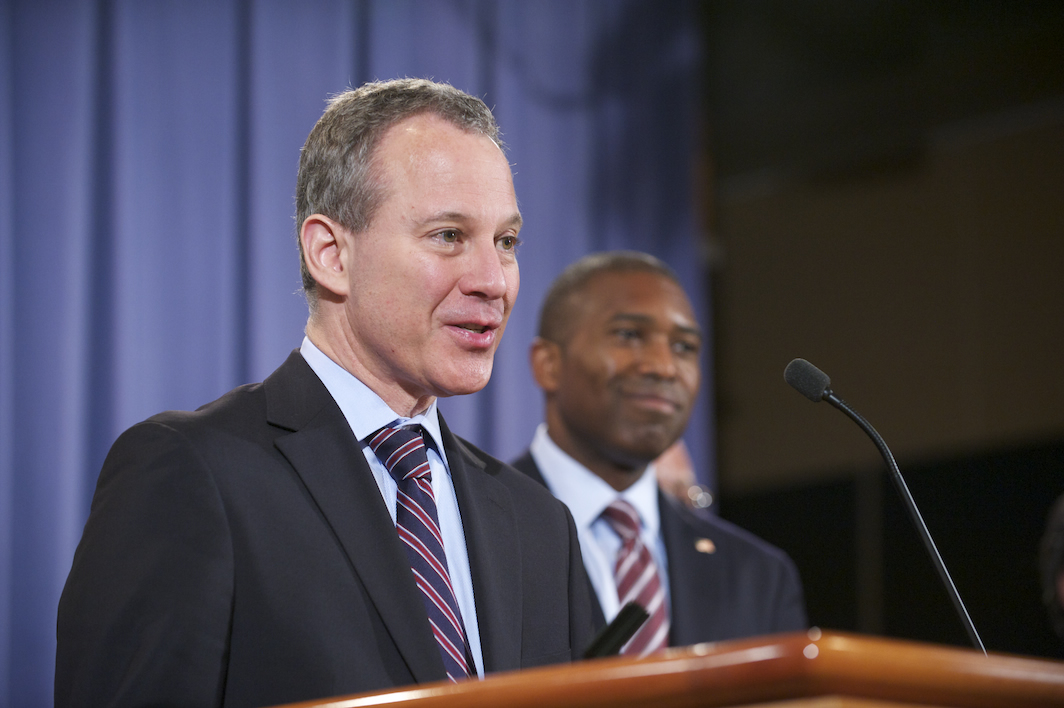It didn’t take long after the Federal Communications Commission to cast its vote to repeal Net Neutrality for the lawsuits to come flying in. Attorneys General of New York Eric Schneiderman and of Washington Bob Ferguson have both announced that they would be filing multi-state lawsuits against the commission. Both officials are not happy with the thought of ISPs taking advantage of their constituents.
Despite the huge blow that Net Neutrality proponents suffered due to the FCC’s vote to repeal, the fight isn’t over yet. In the case of AG Ferguson, his office released a press release indicating a huge interest in fighting back against this decision.
"Today, I am announcing my intention to file a legal challenge to the FCC's decision to roll back net neutrality, along with attorneys general across the country," Ferguson said in the release. "We will be filing a petition for review in the coming days. Allowing Internet service providers to discriminate based on content undermines a free and open Internet. Today's action will seriously harm consumers, innovation, and small businesses."
AG Schneiderman expressed the same intent mere minutes after the vote, with the official saying that the repeal was a blow to New Yorkers and Americans, in general. That’s why he is intent on filing a multi-state lawsuit against the FCC.
"The FCC just gave Big Telecom an early Christmas present, by giving Internet service providers yet another way to put corporate profits over consumers. Today's rollback will give ISPs new ways to control what we see, what we do, and what we say online. That's a threat to the free exchange of ideas that's made the Internet a valuable asset in our democratic process," Schneiderman said.
This is just the start as well. The FCC is currently facing the threat of lawsuits from multiple states all over the country, which include Oregon, Illinois, Iowa, Massachusetts, and of course, California. More are expected to join as events develop.



 Elon Musk’s Empire: SpaceX, Tesla, and xAI Merger Talks Spark Investor Debate
Elon Musk’s Empire: SpaceX, Tesla, and xAI Merger Talks Spark Investor Debate  SpaceX Updates Starlink Privacy Policy to Allow AI Training as xAI Merger Talks and IPO Loom
SpaceX Updates Starlink Privacy Policy to Allow AI Training as xAI Merger Talks and IPO Loom  U.S. Lawmakers to Review Unredacted Jeffrey Epstein DOJ Files Starting Monday
U.S. Lawmakers to Review Unredacted Jeffrey Epstein DOJ Files Starting Monday  OpenAI Expands Enterprise AI Strategy With Major Hiring Push Ahead of New Business Offering
OpenAI Expands Enterprise AI Strategy With Major Hiring Push Ahead of New Business Offering  Trump Administration Sued Over Suspension of Critical Hudson River Tunnel Funding
Trump Administration Sued Over Suspension of Critical Hudson River Tunnel Funding  Google Cloud and Liberty Global Forge Strategic AI Partnership to Transform European Telecom Services
Google Cloud and Liberty Global Forge Strategic AI Partnership to Transform European Telecom Services  Sony Q3 Profit Jumps on Gaming and Image Sensors, Full-Year Outlook Raised
Sony Q3 Profit Jumps on Gaming and Image Sensors, Full-Year Outlook Raised  Panama Supreme Court Voids CK Hutchison Port Concessions, Raising Geopolitical and Trade Concerns
Panama Supreme Court Voids CK Hutchison Port Concessions, Raising Geopolitical and Trade Concerns  Court Allows Expert Testimony Linking Johnson & Johnson Talc Products to Ovarian Cancer
Court Allows Expert Testimony Linking Johnson & Johnson Talc Products to Ovarian Cancer  Supreme Court Signals Doubts Over Trump’s Bid to Fire Fed Governor Lisa Cook
Supreme Court Signals Doubts Over Trump’s Bid to Fire Fed Governor Lisa Cook  Federal Judge Restores Funding for Gateway Rail Tunnel Project
Federal Judge Restores Funding for Gateway Rail Tunnel Project  Missouri Judge Dismisses Lawsuit Challenging Starbucks’ Diversity and Inclusion Policies
Missouri Judge Dismisses Lawsuit Challenging Starbucks’ Diversity and Inclusion Policies  California Sues Trump Administration Over Federal Authority on Sable Offshore Pipelines
California Sues Trump Administration Over Federal Authority on Sable Offshore Pipelines  Nvidia Confirms Major OpenAI Investment Amid AI Funding Race
Nvidia Confirms Major OpenAI Investment Amid AI Funding Race  Jensen Huang Urges Taiwan Suppliers to Boost AI Chip Production Amid Surging Demand
Jensen Huang Urges Taiwan Suppliers to Boost AI Chip Production Amid Surging Demand  Meta Faces Lawsuit Over Alleged Approval of AI Chatbots Allowing Sexual Interactions With Minors
Meta Faces Lawsuit Over Alleged Approval of AI Chatbots Allowing Sexual Interactions With Minors 































